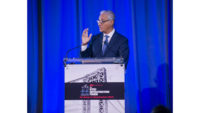The U.S. Army Corps of Engineers is beginning to explore the use of public-private partnerships to repair the nation's aging infrastructure.
"The federal government can't do this on their own," said Lt. Gen. Thomas Bostick, the Army's Chief of Engineers and the Corps commanding general. "We have $1.5 billion to put into projects this year, and we'd need $23.5 billion to finish the projects we're working on at the pace they are being appropriated," he added. "There's only so much that can be done through process efficiencies."
Bostick told reporters at a briefing on June 26 that the Corps has begun pilot efforts to examine private investment in public infrastructure. "We need to talk about public-private partnerships, where these alternative funding means come from outside the government," he said.
Provisions in the new Water Resources Reform and Development Act, signed into law by President Barack Obama on June 10, permit the Corps to start exploring private investment options for Corps projects. Public-private partnerships, or P3s, are already used by some state agencies to meet funding gaps on big infrastructure projects, particularly highways and bridges.
But Bostick emphasized that this is fairly new territory for the Corps. "A lot of these [P3s] are business deals, and we are not dealmakers," he said.
Bostick cited the Corps' experience in partnering with other public agencies, but admitted it has limited experience in pitching a project to private investors. "We have to find ways to monetize what we want the private sector to invest in. The private sector may be vey passionate and want to support the U.S. government, but they have to make profit," he said.
Bostick said he has been meeting with business leaders to discuss how the Corps might best make use of P3s. "When it comes to public-private partnerships, I believe we are all in the infancy of decided what is possible. I've had multiple sessions with CEOs across the country to talk about this issue."
Deciding how best to attract private investment to the nation's water infrastructure is the next step for the Corps' venture into the world of P3s, according to Bostick. "We're looking at how to set up long-term contracts to allow [private investors] to recoup the investment that they put in."



Post a comment to this article
Report Abusive Comment